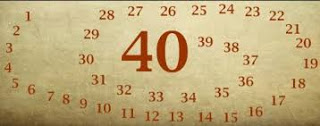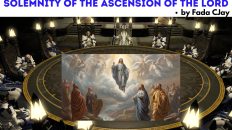WHY DID THE CHURCH MARK OUT 40 DAYS FOR LENT? WHAT IS THE SIGNIFICANCE OF 40?
I have learnt not to underrate the reasoning and knowledge of the little ones. Engaging with them at Catechesis has been a very challenging and interesting moment for me – learning a lot from them. Three days ago, a little girl whom I taught at catechism class some years back during an apostolic work was able to locate me on Facebook; after exchanging pleasantries she asked me an interesting question: “why do we have 40 days for Lent, and not 30 days or 7days; is there any reason for this?”
Have we ever pondered on this question? On this note, I would like to share with you, my reflection.
In the Portuguese language, the word “Lent” translates itself as “Quaresma” which is derived from the word “quarenta”, meaning “forty”. Likewise, in Latin, it is known as “Quadragesima”, meaning fortieth. Therefore, it is the season of the forty days, in which we remind ourselves of the value of repentance, before celebrating the Easter Festival. In English, Lent is not associated with 40, however, it comes from the Anglo-Saxon word “lencten”, which means “spring”, and “lenctentid”, which literally means not only “Springtide” but also was the word for “March”, the month in which the majority of Lent falls. It is pertinent to note that the Council of Nicaea in 325 A.D. (fourth century) fixed the period of Easter such that it would always fall on the Sunday following the first full moon that rose on or after SPRING (vernal) equinox. Hence, Since Easter comes after the spring equinox; it becomes important that the period before Easter (Spring) be associated with Lent.
Having said this, let us now look at the biblical significance of the concept of “forty” associated with this spring (Lent).
In the Old Testament, God punished mankind by sending a flood over the earth for 40 days and nights (cf. Gn. 7:12,17). On Mount Sinai, preparing to receive the Ten Commandments, “Moses stayed there with the Lord for 40 days and 40 nights, without eating any food or drinking any water” (Ex 34:28). the Prophet Elijah fasted and prayed on Mount Horeb for forty days (1 Kings 19:8). The people of Nineveh repented of their sins when Jonah preached that the city would be destroyed in 40 days (Jonah 3:4). The Prophet Ezekiel had to lie on his right side for forty days as a figure of the siege that was to bring Jerusalem to destruction (Ez 4:6). The Israelites wandered in the desert for 40 penitential years until they entered the Promised Land (Num 14:34). Most importantly, in the New Testament, the Lord fasted for 40 days and nights in the wilderness before He began His public ministry (Mt 4:2).
Forty is a prelude for something new; in other words, it signifies “birth”. How can we explain this? In Noah’s case, it was the rebirth of a sinful world that had been cleansed by raging floodwaters. In Moses’ case, it was the birth of the people of the covenant. For the nomadic Israelites, it was the start of a new, settled existence in the Promised Land. And Jesus? What did his forty days mean? The birth of a new Israel liberated from sin, reconciled to God, and governed by the law of the Spirit rather than a law chiseled in stone. Above all, it takes about forty weeks for a woman to carry her developing baby in the womb before a new birth can take place.
For this reason, the Church models her 40-day season of Lent vis-à-vis the holy tradition, established throughout Salvation History, the story of God’s relationship with humanity. By the end of the fourth century, it was well established in the Church that Lent’s duration was 40 days and that prayer and fasting constituted its primary spiritual exercises. As such, to this very day, we observe 40 days of penitential practices, typically of prayer, almsgiving, and fasting because we take Jesus as our model to prepare ourselves for the Paschal feast, that is, Easter.
In conclusion, the Catechism tells us “By the solemn forty days of Lent the Church unites herself each year to the mystery of Jesus in the desert.” (CCC 540). May the good Lord grant us the grace to utilize this 40-day springtime (Lent) in uniting ourselves to the mysteries of Christ in the desert. Amen.
LENTEN HYMN
(from the breviary)
-Jesus, the sun of ransomed earth,
Shed in our inmost souls thy light,
As in SPRING DAYS a fairer birth,
Heralds, each morn, the doom of night





Wonderful, thanks for the info